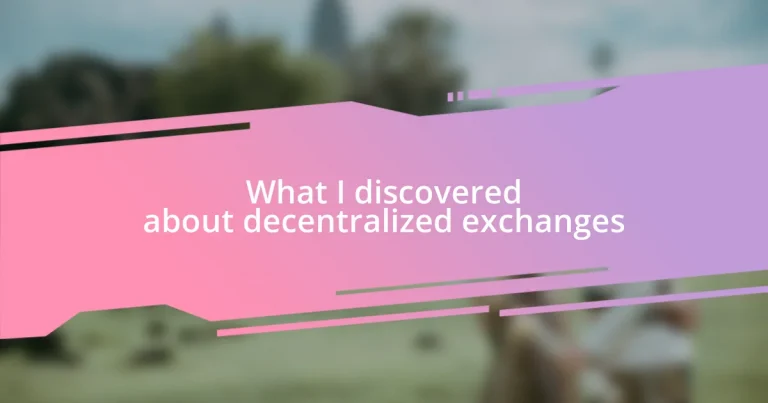Key takeaways:
- Decentralized exchanges (DEXs) empower users by allowing peer-to-peer trading without intermediaries, enhancing privacy, autonomy, and security through smart contracts.
- Key benefits of DEXs include full control over assets, increased user anonymity, and reduced risks of hacking compared to centralized exchanges.
- The future of DEXs is set to feature automated market makers, improved user interfaces, and layer-two solutions to enhance trading efficiency and accessibility.
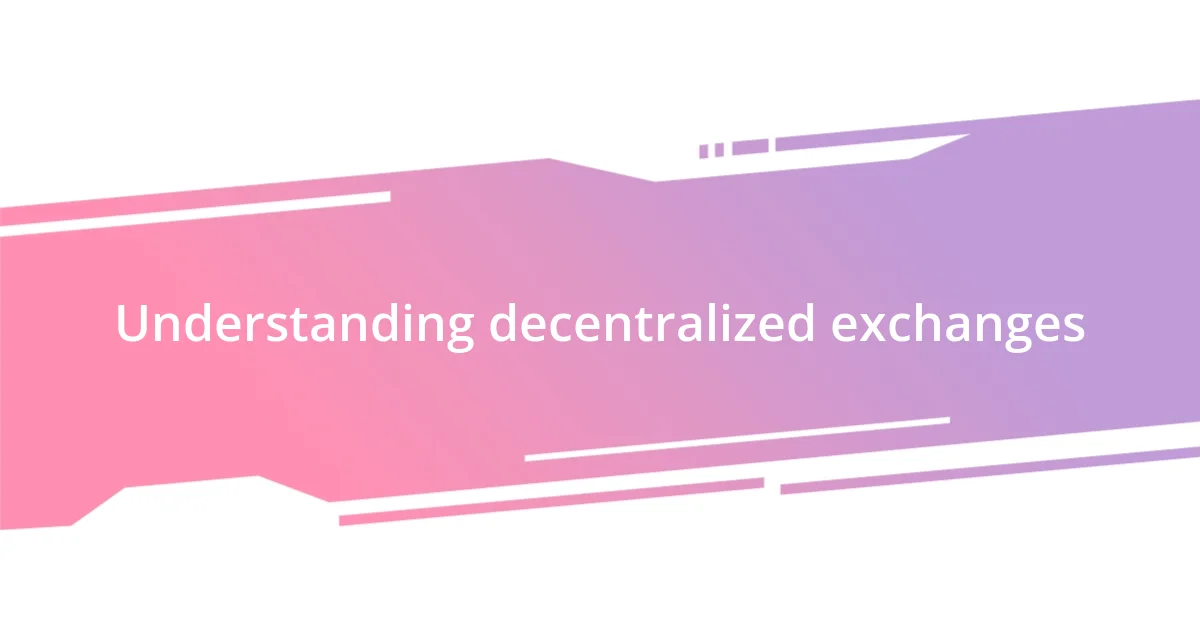
Understanding decentralized exchanges
Decentralized exchanges (DEXs) operate on a peer-to-peer basis, allowing users to trade directly with one another without a central authority. I remember the first time I used a DEX; it was both exhilarating and a bit intimidating! The sheer autonomy I felt, trading directly with someone on the other side of the world, really opened my eyes to the power of this technology. Isn’t it fascinating how this structure can empower individuals and offer a level of privacy that traditional exchanges just can’t provide?
I’ve found that DEXs use smart contracts to facilitate trades and ensure that transactions are secure and transparent. This was a turning point for me—realizing that the trust typically placed in centralized institutions could now be decentralized, coded into algorithms. Have you ever wondered how much we truly rely on those intermediaries? It’s refreshing to think that with DEXs, we can reclaim some of that control over our assets.
Moreover, one of the most captivating aspects of decentralized exchanges is their ability to operate without a single point of failure. I once read about a DEX taking over during a major exchange outage; users could still access their funds and trade seamlessly. How many times have you felt helpless when traditional systems go down, leaving you locked out of your assets? It’s empowering to know that, with DEXs, disruptions in the market or technology won’t necessarily impede access to your funds. This resilience is something I truly value in the cryptocurrency landscape.
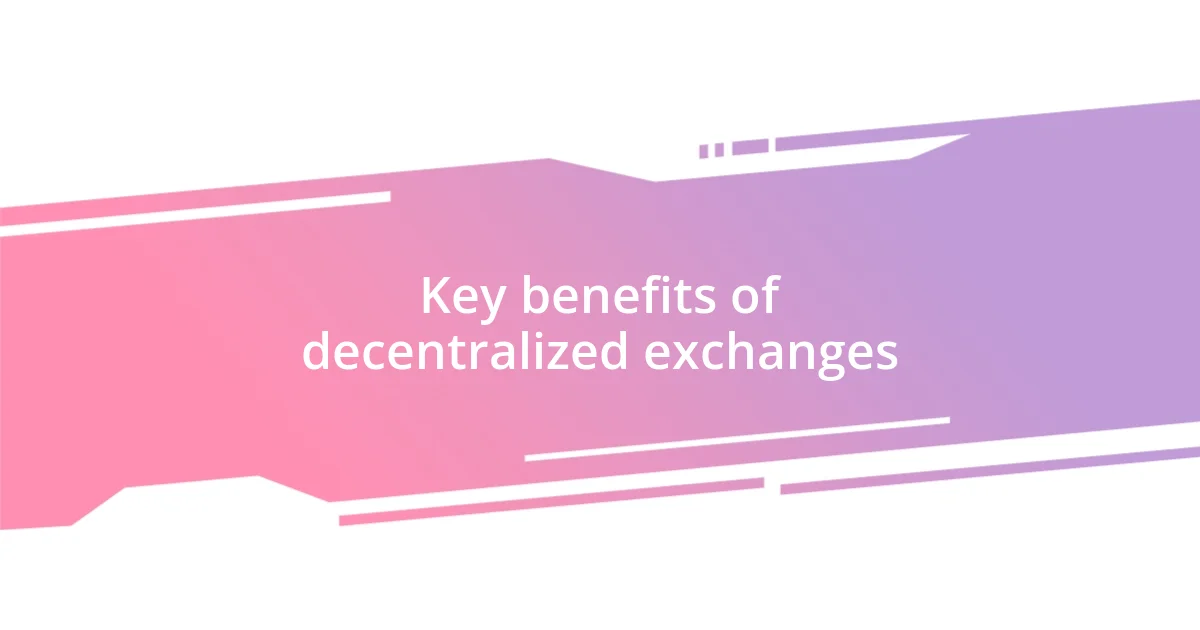
Key benefits of decentralized exchanges
Decentralized exchanges offer a remarkable level of autonomy that I’ve come to appreciate as a trader. Unlike centralized platforms, where you’re often at the mercy of a single entity’s policies, DEXs empower you to maintain full control over your funds. I recall a time when I faced unexpected withdrawal limits on a centralized exchange; the frustration was real! Since I switched to using DEXs, that sense of restriction has vanished.
Moreover, the enhanced privacy of decentralized exchanges is something I find particularly appealing. When trading on a DEX, your transactions are executed without the need for personal data, which resonates deeply with my desire for anonymity in the crypto space. I can’t help but reflect on past experiences where I’ve hesitated to share my information with centralized platforms, fearing potential breaches or misuse. The peace of mind I now enjoy knowing my trades remain private is invaluable.
In terms of security, DEXs come with an added advantage: the absence of a central point of failure makes it much harder for hackers to compromise your assets. A few years ago, I was part of a community discussion following a notable hack on a centralized exchange. The anxiety and loss felt by users were overwhelming, and it was a stark reminder of the vulnerabilities inherent in centralized systems. With DEXs, I’ve been able to enjoy a more secure trading experience, knowing that my assets are safeguarded by blockchain technology rather than sitting in a vulnerable wallet controlled by a third party.
| Benefit | Description |
|---|---|
| Autonomy | Full control over assets, free from centralized limits. |
| Privacy | No personal data is required, enhancing user anonymity. |
| Security | Decentralized nature minimizes hacking risks. |
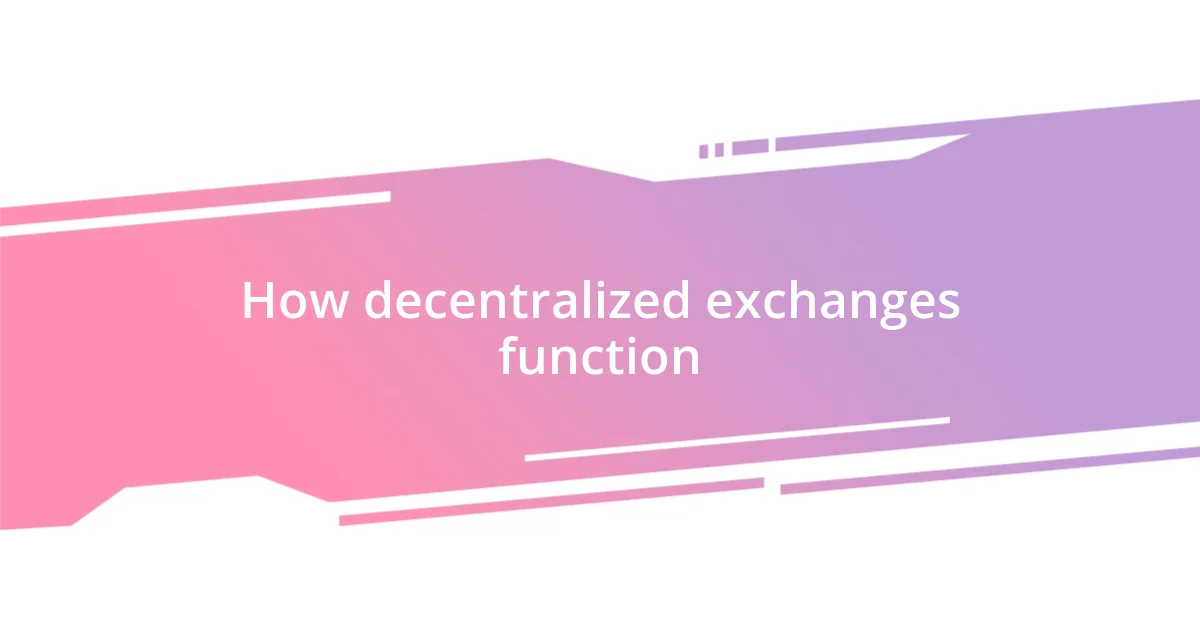
How decentralized exchanges function
Decentralized exchanges operate on the principle of autonomy and direct interaction. Users interact with one another through smart contracts, which automate the trading process without needing intermediaries. I recall feeling a rush of empowerment the first time I executed a trade on a DEX, bypassing the usual bureaucracy I faced with centralized platforms. It was liberating to know that I could execute trades based solely on my terms, free from the constraints that often come with traditional exchanges.
Here’s a glimpse into how DEXs function:
- Peer-to-peer trading: Users communicate directly to trade assets, fostering a community-driven environment.
- Smart contracts: These self-executing contracts ensure transparency and security, automating the execution of trades when conditions are met.
- Liquidity pools: Users contribute assets to pools that increase trading efficiency and allow for seamless transactions.
This was a pivotal moment for me: understanding that my trades could be executed through code rather than a centralized entity. It was thrilling to know I was participating in a system that thrived on decentralization, a sign of trust in technology over individuals. The concept that my transactions were part of an immutable and distributed ledger made me appreciate the blockchain’s potential even more. Each trade felt like a collaboration with the broader community, and I couldn’t help but marvel at how this technology was reshaping financial interactions.
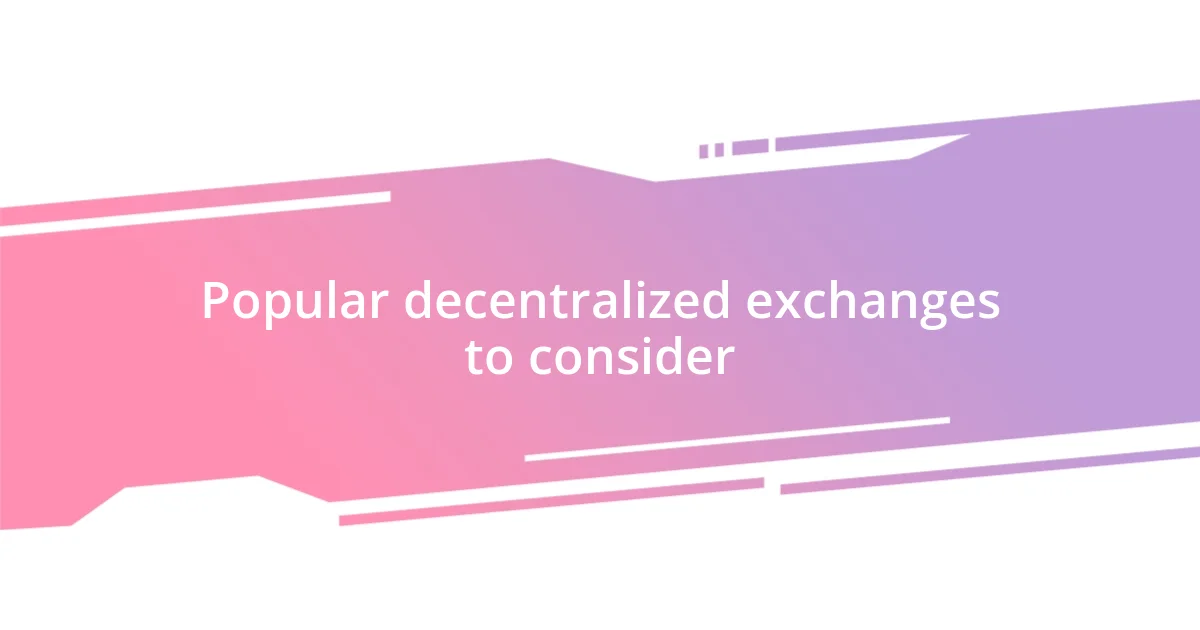
Popular decentralized exchanges to consider
One of the popular decentralized exchanges I’ve come to rely on is Uniswap. The first time I used it, I noticed how intuitive the interface was—much easier than I initially expected for a DEX. I remember thinking, “Is it really possible to trade with such ease without a centralized authority?” Uniswap’s automated market-making model allows users to trade without having to wait for an order to match, which felt like a game-changer for my trading habits.
Another player in the DEX space is SushiSwap. What delighted me about SushiSwap was its community-driven nature; it felt more like a gathering of friends than a cold trading platform. Being able to participate in liquidity rewards and governance truly made me feel like I had a stake in something bigger. Have you ever been part of a project where you feel your voice matters? That’s exactly how I felt while voting on proposals and receiving rewards for my contributions.
Lastly, I can’t overlook the growing popularity of PancakeSwap, especially for those trading on the Binance Smart Chain. I remember my excitement when I first swapped tokens there; the transaction fees were remarkably low compared to Ethereum-based exchanges! Plus, the vibrant community around PancakeSwap made the entire trading experience much more enjoyable. It brought back the thrill of trading early on in my journey, rekindling my passion for exploring new tokens without breaking the bank on fees.
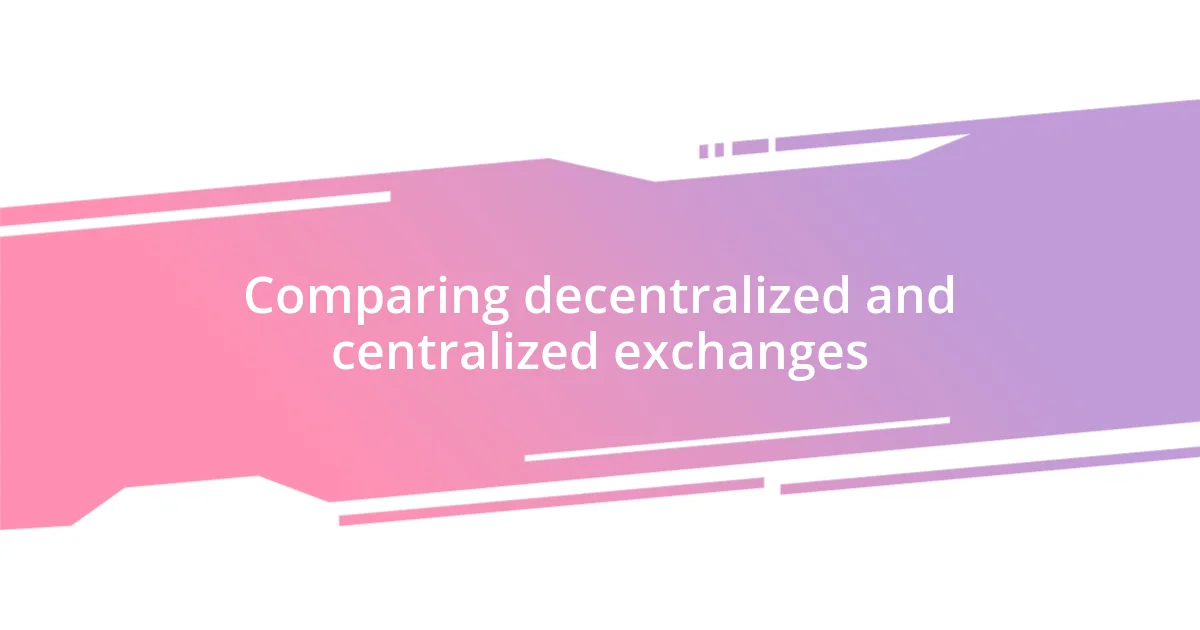
Comparing decentralized and centralized exchanges
When diving into the world of exchanges, the contrast between decentralized and centralized platforms becomes strikingly clear. With centralized exchanges, you often find a more user-friendly interface and a sense of security from established entities managing your trades. Yet, I’ve felt that nagging worry about giving up control over my assets. Have you ever hesitated to hit “confirm” on a transfer, wondering what could happen in a centralized system? That lack of direct ownership can be unsettling.
On the flip side, decentralized exchanges (DEXs) offer unparalleled freedom, which I always find refreshing. Picture this: instead of waiting for a trade to clear through a broker, you can engage directly with other traders, executing orders at your pace. It was almost surreal the first time I participated in a liquidity pool—it felt like a community effort where everyone was contributing to a common goal. This collective vibe encourages me to explore projects I might have overlooked otherwise.
However, it’s essential to acknowledge the trade-offs. While DEXs grant autonomy, they come with increased responsibility. I remember feeling a mix of excitement and anxiety when navigating a new DEX interface for the first time. Was I prepared to handle the intricacies of managing my private keys and the ever-present risk of smart contract vulnerabilities? It’s a learning curve, but for those willing to embrace it, the rewards often outweigh the risks.
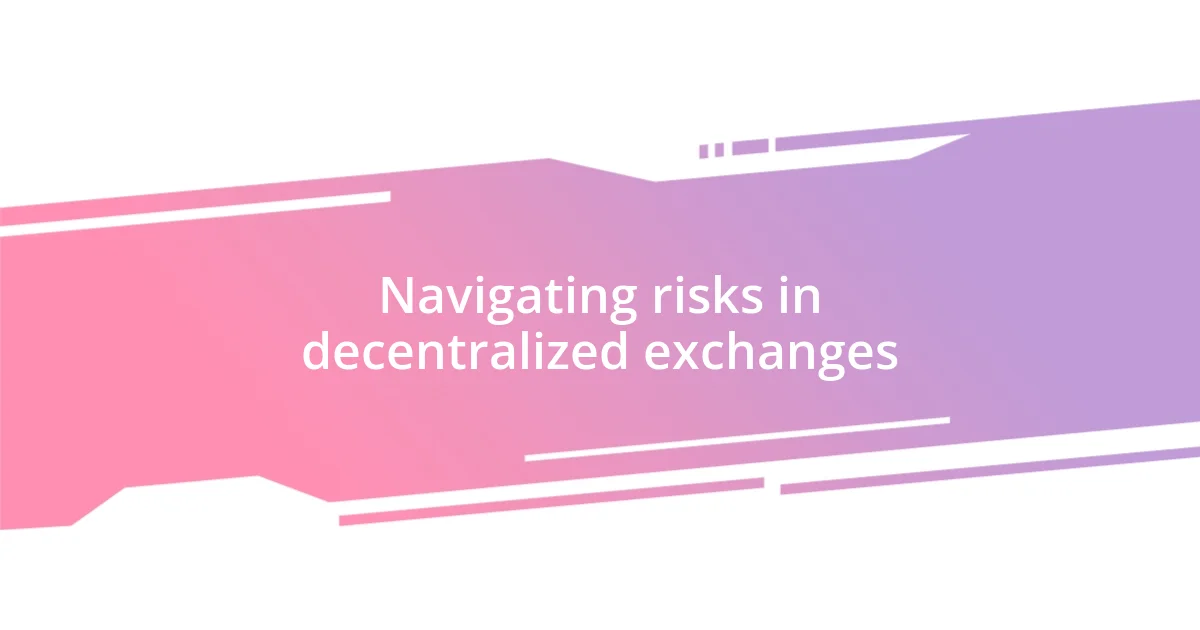
Navigating risks in decentralized exchanges
Navigating the landscape of decentralized exchanges isn’t without its pitfalls. I recall a time when I hastily executed a trade without thoroughly researching the token’s liquidity. The sudden price fluctuation was jarring, leading me to realize just how crucial it is to scrutinize liquidity pools before diving in. Do you think you’d make a hasty trade after witnessing such unpredictability? I definitely learned to double-check those essential details.
Security is another significant concern that keeps me on my toes. The first time I staked my tokens in a liquidity pool, a small voice in my head asked, “What if the smart contract fails?” This fear isn’t unfounded; there have been instances of smart contract exploits leading to substantial losses. My approach now involves doing thorough research on the underlying technology and team behind a DEX before committing funds. It’s essential to stay informed to mitigate such risks.
Lastly, the anonymity of DEXs can be a double-edged sword. I once found myself in a “trust without verification” situation with a lesser-known exchange, feeling a twinge of vulnerability. While the allure of privacy is enticing, it’s critical to vet the platforms you use. Have you ever thought about the importance of reputation in such a decentralized environment? I’ve certainly learned to prioritize platforms with a positive track record to ensure my assets are safer.
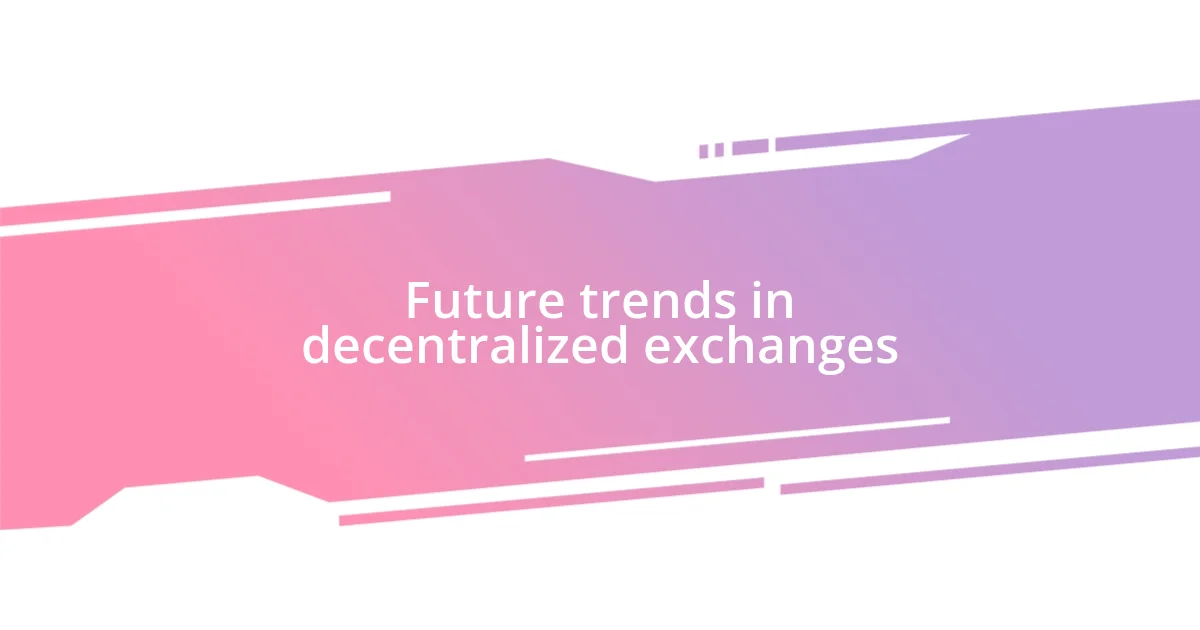
Future trends in decentralized exchanges
The evolution of decentralized exchanges is poised for exciting developments. One trend I foresee is the rise of automated market makers (AMMs) that utilize advanced algorithms to optimize trading efficiency. I remember my first encounter with an AMM, where I felt like I was unleashing the power of technology to facilitate trades. Have you ever wondered how these systems calculate prices in real-time? It’s fascinating to see how they could make trading smoother and even more accessible for everyone involved.
Moreover, we’re likely to see improvements in user interfaces designed for DEXs. The complexity of wallets and trading interfaces can be daunting, but I believe future platforms will incorporate more intuitive designs. I often think back to my early days in crypto, when I struggled to navigate clunky interfaces and felt lost. It’s exciting to think about a future where newcomers can jump in without feeling overwhelmed. Could streamlined platforms make crypto trading less intimidating for new users? I certainly hope so.
Another noteworthy trend might be the integration of layer-two solutions to enhance scalability. I’ve felt the frustration of congestion on various platforms, where slower transaction speeds can stall trades. Imagine a scenario where DEXs operate effortlessly, sidestepping these barriers with layer-two protocols. This kind of innovation could lead not only to a surge in user adoption but also to a more vibrant trading ecosystem. Isn’t it exhilarating to think about what the future holds for decentralized exchanges?












